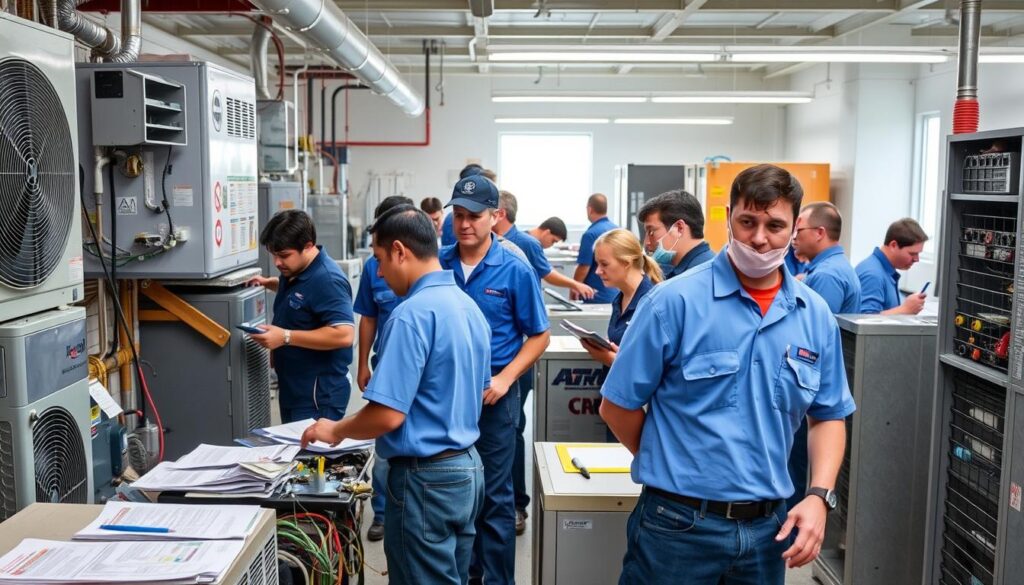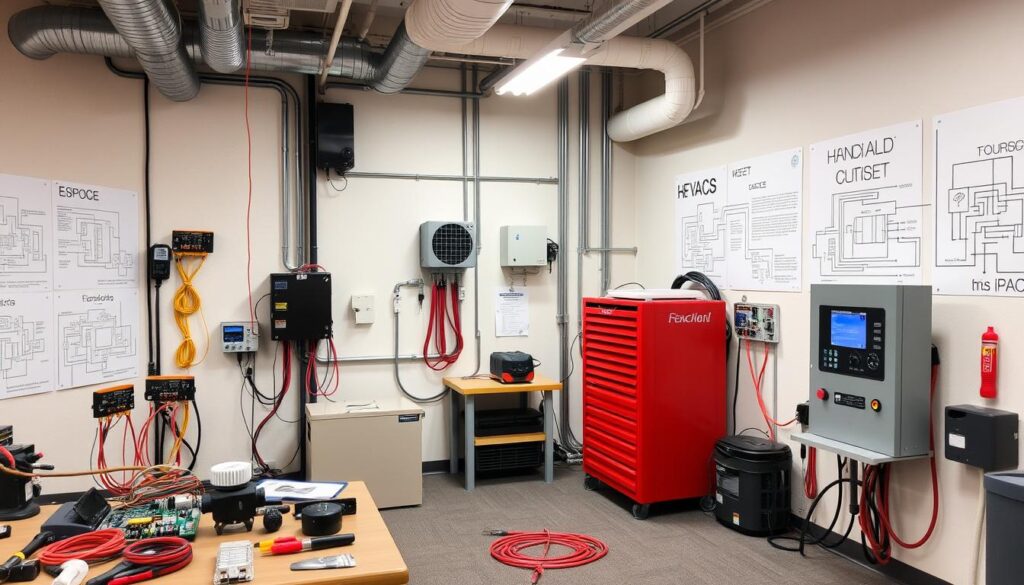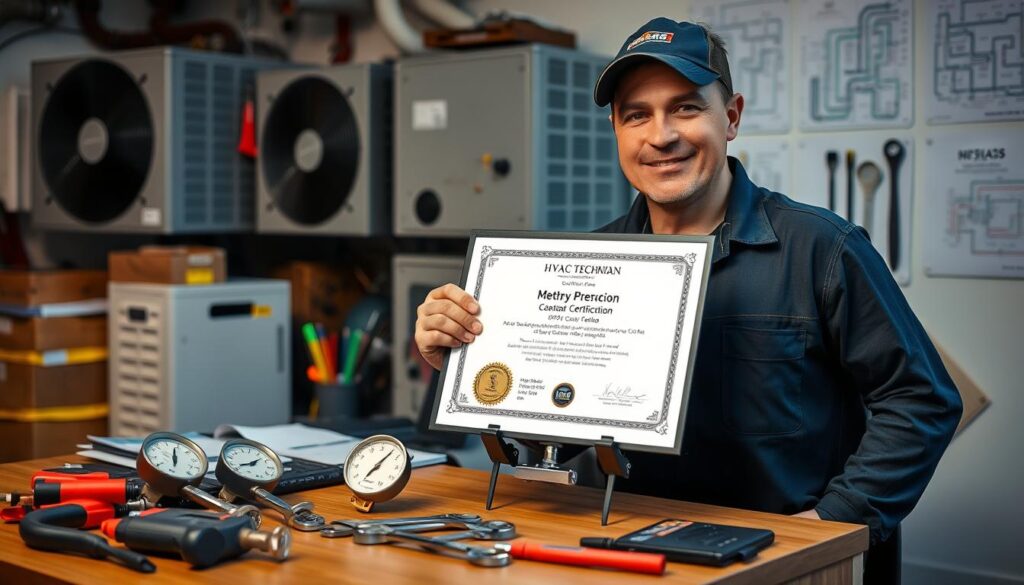Affiliate Disclosure
HVAC Guide Guys is a participant in the Amazon Services LLC Associates Program, an affiliate advertising program designed to provide a means for sites to earn advertising fees by advertising and linking to Amazon.
Does HVAC Provide On The Job Training? Are you thinking about a career in HVAC but worried about training? Many people ask if they’ll get the training they need. Luckily, many HVAC companies offer great on-the-job training programs.
These programs help new technicians learn the skills they need to do well. You can start as an entry-level worker or join an apprenticeship. This way, you can get hands-on experience and build a fulfilling career in HVAC.

Key Takeaways
- HVAC companies often provide on-the-job training opportunities for new technicians.
- Entry-level positions and apprenticeships are common pathways to gain practical HVAC skills.
- On-the-job training covers hands-on experience with equipment, safety protocols, and troubleshooting techniques.
- Learning from experienced mentors can offer a more personalized and in-depth learning experience compared to traditional classroom education.
- Union HVAC technicians may enjoy benefits like fully paid medical coverage, guaranteed raises, and pension plans.
Table of Contents
Understanding HVAC On-The-Job Training Fundamentals
Are you thinking about becoming an HVAC technician? You might wonder about the role of on-the-job training. HVAC on-the-job training is key to your education. It gives you hands-on experience and lets you apply what you’ve learned in class.
What is HVAC On-The-Job Training?
HVAC on-the-job training means learning by doing, with the help of experienced technicians. You’ll work on real HVAC systems, fix problems, and improve your skills. This way, you’ll understand the industry better and be ready for the job’s challenges.
Benefits of Hands-On Training in HVAC
- Immediate application of skills: On-the-job training lets you use what you’ve learned right away. This makes you more confident and helps you understand better.
- Exposure to real-world scenarios: Working on live HVAC systems prepares you for real challenges. You’ll learn to solve problems in a real setting.
- Earning while learning: Many hvac on-site training programs let you earn money while you learn. This makes your education more affordable and accessible.
Key Components of HVAC Training Programs
HVAC vocational training covers important topics. These include:
- Basic electricity and electrical systems
- Refrigeration theory and application
- Air conditioning systems and troubleshooting
- Heating systems, including gas, electric, and oil
- Safety protocols and best practices
By learning these topics through class and hands-on training, you’ll become a skilled HVAC technician.
“The HVAC Training Program at UEI College covers topics such as basic electricity, motors, and HVAC Controls. The curriculum includes courses on Basic Refrigeration Theory and Application focusing on safe refrigerant use.”
Does HVAC Provide On The Job Training: A Comprehensive Guide
The HVAC industry focuses on practical training. Many HVAC companies offer on-the-job training. This includes hvac job shadowing, hvac internships, and apprenticeships. These methods help newcomers gain practical experience and learn industry skills.
On-the-job training is key for HVAC workers. It boosts job performance and satisfaction. It also reduces errors and accidents. Training methods include on-the-job, classroom, online, apprenticeships, and job shadowing.
Effective on-the-job training aligns with business goals. It provides clear instructions and hands-on practice. Feedback and coaching are also important. Using real-world scenarios helps too. But, challenges like resource shortages and resistance to change can occur. Solutions include allocating resources and offering flexible training.
Apprenticeships and Internships in HVAC
The HVAC industry values practical skills over formal degrees. Training options include trade schools and hvac career development programs like apprenticeships. Apprentices work alongside experienced technicians, applying classroom knowledge in real-world settings.
| Training Option | Duration | Key Benefits |
|---|---|---|
| HVAC Apprenticeship | 3 to 5 years | Extensive hands-on training, earning while learning, industry-recognized certifications |
| HVAC Vocational Program | 6 months to 2 years | Focused technical education, preparation for HVAC certifications |
Certifications from NATE and the EPA are vital for HVAC technicians. They show a technician’s skills and knowledge. HVAC technicians must also keep up with new technologies and regulations to stay competitive.
The Role of Apprenticeships in HVAC Career Development
HVAC apprenticeships are key for those starting in HVAC. They mix hvac on-site training with classroom learning. This way, people learn by doing and get paid for it.
Types of HVAC Apprenticeship Programs
There are many HVAC apprenticeships to choose from. They meet different needs and preferences. Here are a few:
- Union-sponsored apprenticeships, which offer standardized training, negotiated wages, and benefits
- Non-union apprenticeships, which provide more flexibility in training but may vary in pay and benefits
- Company-specific apprenticeship programs, tailored to the needs of individual HVAC businesses
Duration and Structure of Apprenticeships
HVAC apprenticeships usually last 3 to 4 years. They combine paid work experience with classroom learning. This helps apprentices build their skills and gain valuable hvac career development experience.
Earning While Learning Benefits
One big plus of HVAC apprenticeships is earning while you learn. Apprentices start with half the pay of a full technician. But, as they progress, their pay goes up. This model helps apprentices financially and makes learning more accessible.
| Statistic | Value |
|---|---|
| Average annual salary for HVAC apprentices | $26,000 to $43,000 |
| Average hourly rate for HVAC apprentices | $16.38 |
| Typical duration of HVAC apprenticeships | 3 to 4 years |
“HVAC apprenticeships provide a unique opportunity for individuals to gain hands-on experience and earn a living while developing their skills. This dual approach to learning is invaluable for a successful hvac career development.”
Essential Skills Learned Through HVAC On-Site Training
To become a skilled HVAC technician, hands-on learning is key. HVAC on-site training teaches aspiring professionals the skills they need. They learn about equipment installation, maintenance, troubleshooting, and safety.
Trainees become experts in working with different HVAC systems. They learn to read blueprints, do load calculations, and handle refrigerants like Freon safely. They also get to know how to do preventative maintenance and understand pumps, piping, and electrical systems.
Being able to solve problems quickly is crucial for HVAC technicians. HVAC hands-on learning helps them develop critical thinking and troubleshooting skills. This prepares them to handle complex challenges.
Good communication is also a key skill learned through on-site training. HVAC technicians need to explain technical stuff in simple terms and provide great customer service. The training includes lessons on how to interact with customers and behave on the job site.
In the end, hvac on-site training gets trainees ready for the job’s physical demands. They learn to lift heavy equipment, work in tough conditions, and manage tight schedules. These programs mix theory with practice, making sure graduates are ready to start working in the HVAC industry.
| Essential HVAC Skills Learned | Benefits of Hands-On Training |
|---|---|
|
|
“Hands-on training is essential for aspiring HVAC technicians to develop the comprehensive skill set required for success in the field.”
Basic Refrigeration Theory and Practical Application
HVAC training programs focus a lot on refrigeration theory and how to apply it. You’ll learn about refrigeration systems, including how to handle refrigerants and fix common problems. This training is key for success in the hvac refrigeration training field.
Understanding Refrigerant Handling
Handling refrigerants safely is a big part of hvac refrigeration training. You’ll learn about EPA rules, how to dispose of refrigerants, and work with pressurized systems. Knowing how to manage refrigerants is vital for keeping HVAC systems running well and following environmental laws.
Safety Protocols and Best Practices
Safety is a top priority in HVAC. Your training will cover hvac safety protocols for working with dangerous materials and systems. You’ll learn about protective gear, how to lock out systems, and emergency steps to keep everyone safe.
Troubleshooting Common Issues
Being able to find and fix problems is a key skill for HVAC techs. Through hvac troubleshooting exercises, you’ll learn to spot and solve common issues. This hands-on training will help you develop the problem-solving skills needed to succeed.
| Training System | Key Focus Areas |
|---|---|
| Basic Refrigeration Learning System T7045 | Temperature and pressure measurement, heat transfer, phase change effects, condensers, evaporators, refrigeration system performance |
| Commercial Refrigeration Learning System T7400 | Operating and troubleshooting commercial refrigeration systems |
| Residential Heat Pump Troubleshooting Learning System T7100 | Hands-on skills for HVACR technicians working with residential HVAC systems that use a heat pump |
By learning the basics of refrigeration and how to apply them, you’ll be ready to succeed in HVAC. The skills and safety knowledge you gain in hvac refrigeration training will be a strong base for your HVAC career.
Electrical Systems and HVAC Controls Training
Becoming a skilled HVAC technician is more than just knowing how heating, ventilation, and air conditioning systems work. HVAC electrical training and control systems knowledge are key parts of on-the-job training.
As an HVAC trainee, you’ll explore the details of electrical systems and control technologies. You’ll learn to read wiring diagrams, fix electrical problems, and work with control systems. These systems manage temperature, humidity, and air flow in homes and businesses.
The training includes many HVAC control systems, like programmable thermostats and electronic control boards. You’ll practice calibrating, programming, and keeping these systems running. This ensures you can find and fix HVAC diagnostics problems well.
| Training Component | Key Learnings |
|---|---|
| Electrical Systems |
|
| HVAC Control Systems |
|
By learning both the mechanical and electrical sides of HVAC systems, you’ll be ready to tackle many problems. This ensures systems work well and use energy efficiently in homes and businesses.

“The comprehensive HVAC electrical and controls training prepares technicians to handle a variety of systems, from basic thermostats to complex building automation technologies.”
Commercial HVAC Training Opportunities
The need for efficient HVAC systems is growing fast, especially in big commercial and industrial places. HVAC training for these areas teaches technicians how to work with complex building automation systems and energy management plans.
Large-Scale System Operations
Commercial HVAC training teaches how to handle big HVAC systems in places like offices, hospitals, and factories. Technicians learn to fix and keep chillers, cooling towers, and central plant gear running well. This ensures the climate is just right.
Building Automation Systems
Building automation systems are key in commercial HVAC training. They let people control and watch over many building systems, like HVAC, lights, and security, from one place. Technicians learn to set up and keep these systems running smoothly, saving energy and making people comfortable.
Energy Management Training
With energy costs going up and the planet getting warmer, commercial HVAC training focuses on saving energy. Technicians learn how to cut down on energy use, like by changing settings or using green energy. They also get good at looking at data to find ways to make systems better and save money.
These training programs are crucial. They teach technicians the skills needed for big buildings and facilities to run well and be kind to the planet.
Career Advancement Through On-The-Job Experience
The HVAC industry is full of chances for career growth and skill improvement. HVAC technicians get better with practice and learn new skills. This lets them explore different areas that match their interests and goals.
Specializing in certain HVAC areas is a big plus. Technicians might focus on commercial refrigeration, industrial systems, or energy management. They could also move into renewable energy, like solar or wind power.
Staying updated and learning more can lead to supervisory roles. This includes being a shop steward, foreman, or field service supervisor. Experienced ones might even manage teams, handle technical estimates, or train others on new HVAC tech.
For those who want to be their own boss, HVAC experience is key. It helps start independent HVAC businesses. With their skills and customer service, they can build successful companies or consultancies.
Every career path in HVAC is exciting and rewarding. Technicians can keep learning, face new challenges, and reach their professional dreams.
“The HVAC industry is constantly evolving, and the opportunities for personal and professional growth are truly limitless. With the right mindset and a commitment to continuous learning, HVAC technicians can chart a fulfilling and rewarding career path.”
HVAC Certification and Licensing Requirements
Entering the HVAC world can be complex but rewarding. Knowing the certification and licensing needs is key for those starting in this field. Let’s look into how these steps can guide your career path.
HVAC Certification Programs
HVAC training often leads to various certifications. These include:
- EPA Section 608 Certification: This is needed for working with refrigerants, a must for HVAC techs.
- NATE (North American Technician Excellence) Certification: This shows a technician’s skills and knowledge in HVACR systems.
- Manufacturer-specific Certifications: These allow techs to work on specific products from certain manufacturers.
HVAC Licensing Requirements
Licensing for HVAC techs varies by state and area. It usually requires training, experience, and passing an exam. For instance:
- In Alabama, you need 3,000 hours (18 months) of experience under a licensed contractor to take the exam.
- Arizona asks for four years of experience or two years plus a course or apprenticeship for a license.
- California requires a $25,000 contractor license bond for jobs over $500.
It’s vital to check your state or local area’s specific licensing needs to meet them.
Staying Up-to-Date with Industry Standards
The HVAC field is always changing. It’s important for techs to keep up with new standards and practices. Continuing education and training help you stay competitive and serve clients well.
Understanding HVAC certification and licensing can help you build a fulfilling career in this field.

Combining Trade School Education with On-Site Training
Many people wanting to be HVAC professionals mix trade school education with on-site training. This way, they learn both theory and practical skills. It prepares them well for the HVAC field.
Benefits of Dual Learning Approaches
Learning at trade school and getting hands-on experience has many benefits. Students can use what they learn in class to solve real problems. This helps them learn faster and get a job sooner.
Program Integration Strategies
- Cooperative education programs that alternate between classroom and on-site work
- Apprenticeship models that mix technical lessons with supervised training
- Flexible schedules for part-time HVAC trade school and work experience
Time and Cost Considerations
The dual learning path might take longer, but it’s worth it. HVAC education options that combine school and work lead to quicker career growth. Some employers even help with education costs.
Choosing a learning strategy that includes HVAC trade school and on-site training is smart. It sets aspiring HVAC professionals up for success in a growing field.
Mentorship and Professional Development in HVAC
In the HVAC industry, mentorship is key for learning and growing. Experienced technicians guide newcomers, sharing their knowledge and best practices. This helps newbies develop their skills and builds a sense of community.
HVAC pros can also grow by attending conferences, workshops, and joining organizations. These activities keep them updated on trends and technology. They also open doors to new career paths and opportunities.
Investing in education through hvac mentorship programs and hvac professional growth can lead to big career wins. By combining training, classroom learning, and networking, HVAC techs can become well-rounded. This sets them up for success in the hvac industry networking.
“Mentorship and professional development are essential for HVAC technicians to stay ahead of the curve and excel in their careers. The industry is constantly evolving, and staying informed and connected is key to success.”
By taking advantage of mentorship and growth opportunities, HVAC pros can improve their skills and job satisfaction. They also help the HVAC industry grow and improve.
Conclusion
The HVAC industry offers many career opportunities for those looking for a stable job. With on-the-job training, you can learn the skills needed to succeed. HVAC training mixes classroom learning with real-world practice.
This prepares you to handle the challenges of heating, ventilation, and air conditioning systems. As the demand for HVAC technicians grows, the benefits of HVAC training become clear. The industry is expected to see a 15% increase in jobs by 2026, says the Bureau of Labor Statistics.
Now is a great time to explore the HVAC industry growth and the career paths it offers. Investing in your training can lead to higher salaries and a successful career. HVAC technicians are in high demand, making it a promising field.
If you’re starting your career or looking for a change, HVAC is a great choice. It offers growth and fulfillment. With hands-on training, you can build a stable and rewarding career in this essential industry.

